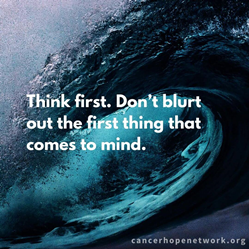
Most of all, remember that you and your friend are not alone. This journey is new for you, but you’re not the first to travel this road. Speaking with someone who has faced a similar experience can provide comfort and hope.
CHESTER, N.J. (PRWEB)
August 31, 2020
Just found out your dear friend has cancer?
It’s hard to hear your doctor say the words “You have cancer.” It’s heartbreaking when your friend or family member shares their diagnosis. Once the shock wears off, the questions and fears can be overwhelming.
How should I respond? What if I say the wrong thing? What are the best ways to help? Words are failing me. I’m scared. I want to DO something.
We’ve talked to experts – the cancer survivors and caregivers who serve as CHN Support Volunteers – and have five practical ways to help.
*Choose your words carefully. Or just be.*
It sounds simple. But in their rush to find common ground, people say some pretty awful things. “My aunt/cousin/colleague’s friend died from that!” “Did you smoke?” “Have you tried (insert alternative therapy here)?”
Think first. Don’t blurt out the first thing that comes to mind. There’s still a chance you’ll say something you wish you could take back – but it’s much less likely.
It’s ok to talk about topics other than cancer. “You don’t need to say ‘I’m sure it’s gonna be ok,’” suggests two-time survivor Dale. “You don’t know that. Keeping the conversation as normal as possible was so meaningful.”
Still not sure what to say? Saying nothing is ok too. Sometimes, there aren’t right words. But your presence – physically or digitally – can make all the difference.
*Don’t ask, do.*
Grabbing your keys (and a mask!) can help too. Survivor Ed recalls how meaningful it was to have his brother-in-law driving him to treatment. Support Volunteer Mona’s friends took her dancing after her first chemo. “My friends were there to encourage me and give me strength when I was weak. I realized it’s true that you never know what strangers will become your friends and family.”
Asking for help is difficult. Offering help removes that burden from the patient we love. Anything that moves beyond “let me know if you need anything” is progress. Support Volunteer Kathy remembers small, everyday gifts of time and help. “Sometimes, those ordinary moments are the best moments. The little things mean so much more than the big.”
*Check in. Consistently.*
Time and again, survivors remember the loneliness and isolation cancer brought. “I found out who my friends are. And who they weren’t,” said long-term cervical survivor Ellen. “Some people shut down and turned away. I know cancer scares a lot of people. You don’t know what to say. I don’t myself. But people who were just there made a huge difference. The smallest kindnesses mean something.”
Life’s busy. Checking in matters, but it doesn’t have to be dramatic. Survivor after survivor mentioned silly emails, funny memes and the quick call to say hello.
If life keeps getting in the way, setting a reminder or alarm is a good way to build the consistency you want to give and that your loved one so desperately needs.
*Think practical. Think small.*
Small portions make a big difference. Jenn recalls friends who brought a meal each week, “it was often enough that we could eat for a couple days. It wasn’t too much – and it was spaced out.” For caregiver Marlys, small, freezer-ready dishes made life while her husband was in hospice care more manageable.
If cooking’s not for you, gifts like pajamas, hats or (audio!) books are loving that’s a simple click away. Cleaning services make life easier. This really is one of those times that the thought counts.
*Connect*
Help isn’t just for patients. For caregivers thrust into a world of appointments and pickups and newfound duties while balancing their own responsibilities, it’s easy to feel overwhelmed. It’s also easy to feel guilty about being overwhelmed when you feel you “should” be focused on your loved one who “has it worse.”
“You have to call and get help. I’d call my daughter to come stay with him for a few hours. You need to have someone you can call on so you can take breaks. I couldn’t let myself get worn down – my oncologist said I had to listen to my body – no matter if it’s 80 degrees out and you should be out planting flowers, if you’re tired, lay down and take a nap. You can’t do it by yourself. You’re a person, you’re a human and you cannot.” ~Anne, survivor, caregiver
Most of all, remember that you and your friend are not alone. This journey is new for you, but you’re not the first to travel this road.
Speaking with someone who has faced a similar experience can provide comfort and hope. It can also provide more practical solutions and tips. Request a caregiver/friend match for yourself – or encourage your friend to request a free and confidential match with a trained survivor Support Volunteer.
“Doctors can only go so far – they’ll feed you the information that’s needed,” says esophageal survivor Joe. “Cancer Hope Network has volunteers who have gone through the gauntlet and we’re able to talk to people on the same level and go through what’s about to happen to them.”
Sarah Miretti Cassidy is the Director of External Affairs for Cancer Hope Network. Contact her at 908.879.4039 ex 20 or scassidy (at) cancerhopenetwork.org.
Share article on social media or email:

